Alumni, Broadcom MASTERS, ISEF
Sibling Scientists: Society alum discuss shared family love of research
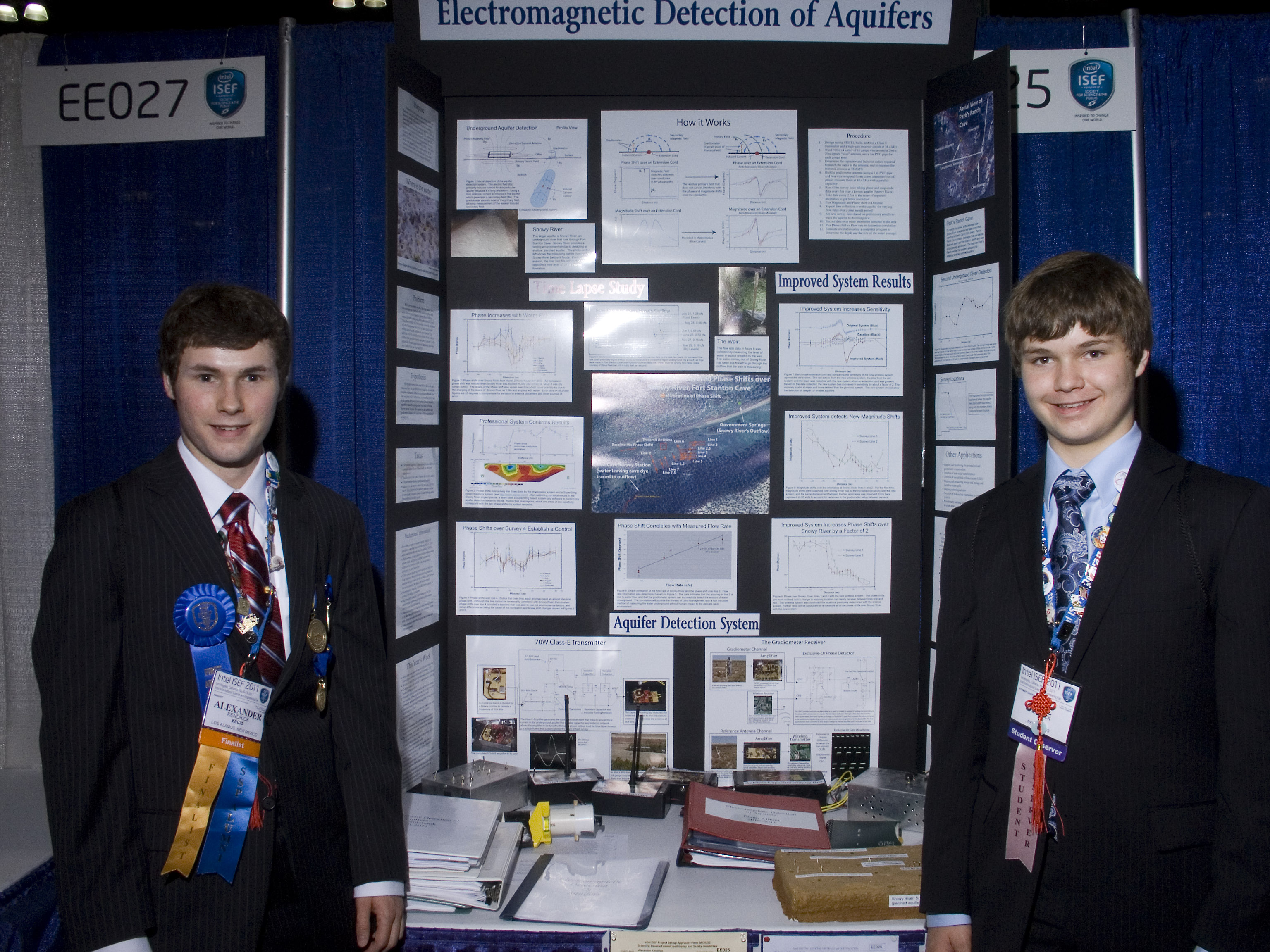
Alex Kendrick, a senior physics major at Harvey Mudd College in Claremont, CA and his younger brother Cole, a junior at Los Alamos High School, are alumni of several Society for Science and the Public programs. Alex participated in the Discovery Channel Young Scientist Challenge in 2006 and 2007, as well as Intel ISEF 2009 – 2011. Cole participated in Broadcom MASTERS 2011 and Intel ISEF 2013 and 2014.
Through Intel ISEF, the Kendrick brothers have had further opportunities to explore research around the globe. Alex spent a week in Switzerland after winning the Intel ISEF Special Award trip to CERN. In 2014, Cole won the American Astronomical Society special award, landing him a trip to Seattle to participate in the annual meeting.
Alex is graduating this spring, with plans to continue to graduate school to study either solar or geophysics. Cole is continuing his research in the astrophysics field. We caught up with the brothers to hear more about their family involvement in all things science and research related.
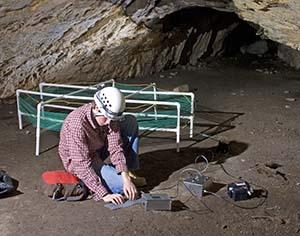
Can you provide a short description of your research project and how you initially became interested in this topic?
Cole– I’ve been doing astrophysics projects for the science fair since the 5th grade. I’ve always had a passion to learn more about space and computers My dad built a telescope and we would look at the planets or the moon, which I found fascinating. I also started learning Python towards the end of elementary school and thought that was really cool and fun.
My project last year was to simulate the formation and lifecycle of classical Novae. I was able to create a simple computer simulation that can be used to predict unknown parameters of a nova system, as well as model the explosion frequency and accretion rate.
Alex– The research I presented at the American Astronomical Society meeting was the result of a summer of research at the Solar REU (research experiences for undergraduates) program at the Harvard-Smithsonian Center for Astrophysics.
I worked with Kamen Kozarev on measuring the speed of coronal mass ejections from the sun. The sun is continuously expelling material in explosive events, and these explosions can accelerate particles that can damage satellites and harm the power grid on Earth. I primarily wrote computer programs to get information from these events that will help Kamen model these events to help analyze which events could cause problems on Earth.
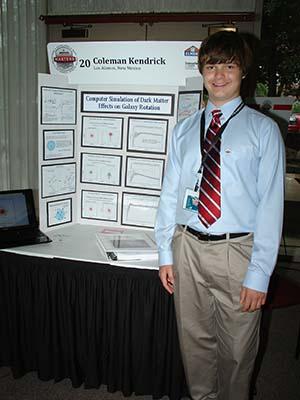
How is science and research explored and supported in your family?
Cole– As far as I can remember, science and research have always been supported in my family. My dad really helped me get started, putting many hours into teaching and helping me. I started doing science fairs at a young age primarily due to Alexander’s involvement in them, and also because it allowed me an opportunity to research things not covered in school.
Alex– Initially I became interested in caves and cave science after a family vacation to Carlsbad Caverns, NM. After that trip, I wanted to explore caves further so my dad and I joined the local caving group in Los Alamos. At that point doing science fair projects on caves seemed like a natural connection.
Science fairs became some serious family bonding time after lengthy trips to the southern part of the state to test my projects in caves. Fortunately for Cole and me, our parents were willing to support us and even help me test things in the field during my science fair projects. My dad was a really great resource who also enjoyed building electronics and was willing to spend a lot of time explaining things to me.
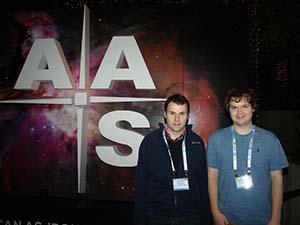
Alex, can you tell us about your experience presenting and competing at the AAS meeting in Seattle earlier this year?
Being able to attend and present at the AAS meeting in Seattle was a really awesome experience. There were tons of people to meet from all over the world, and there was either a presentation or a person doing research on practically anything you could think of that is space related. It was a great opportunity to be able to present my work at the meeting.
What was it like to present your research alongside your brother at the AAS meeting?
It was exciting to present at the same conference as my brother. It definitely reminded me of science fairs where both of us would present different projects. It was also fun to introduce my brother to my undergraduate friends who were at the conference.
Cole, how was your experience presenting at the same meeting as your brother?
It was pretty cool to be able to present at the same conference with my brother. I never thought that it could happen, but it’s a pretty rare opportunity where our research lined up close enough.
Alex, can you tell us about your experience at CERN?
Going to CERN was really awesome! We were somewhat fortunate that the LHC was down for repairs at the time so we were allowed to go in the tunnels to see one of the experiments, the Compact Muon Solenoid.
I was really struck by the size and the scale of the experiment. Seeing pictures really cannot compare to seeing the experiment in person. In addition to the excitement of visiting CERN, it was also nice to meet, and become friends with, a group of students who were just as excited about science fair and CERN as I was. I was already interested in studying physics in college at that point, but I think my visit to CERN definitely reinforced my desire to learn more about physics going forward.
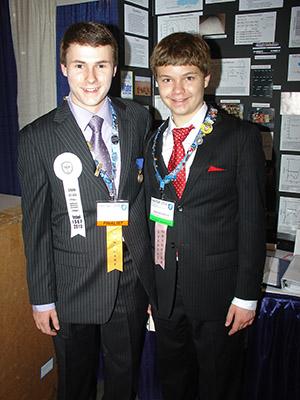
Have you ever conducted research together? How have you helped and supported each other’s work?
Cole– We have not done research together, but we have worked on some side projects before. I remember being dragged along to help Alexander with various radio tests and experiments for his projects. While we don’t always directly help each other with research, we do listen and ask questions about each other’s research, which often leads to dinner being dragged out for an extra hour or two.
Alex– We have tried a couple of computer programming projects where we would try to make an app together. We definitely spend a lot of time at the dinner table talking about what we have been working on.
Do you have any advice for other young students interested in science?
Cole– My advice would be to pick something that you are really interested in and stick with it, but also don’t be afraid to branch out and explore something new. With science, you aren’t restricted to anything.
Alex– I think the key thing is to remain motivated. Science fairs take a lot of time and can be challenging experiences. The middle portion of your project might not be very exciting, but if you keep the end goal in mind, you will make it.
Cole– If your research leads to a new discovery or a new way of handling the problem that hasn’t been done before, it is extremely exciting. Also don’t be afraid to ask for help. Having another person’s input or different perspective on the problem can be invaluable.
Alex– Fortunately for me, my parents encouraged me along the way which helped me get everything done on time. I am not an experienced scientist by any stretch of the imagination, but science is always a lengthy process and it is important to keep that in mind.
Studying science offers students freedom to explore unknown, and really cool properties of the universe and not a lot of other professions offer that kind of an experience.


